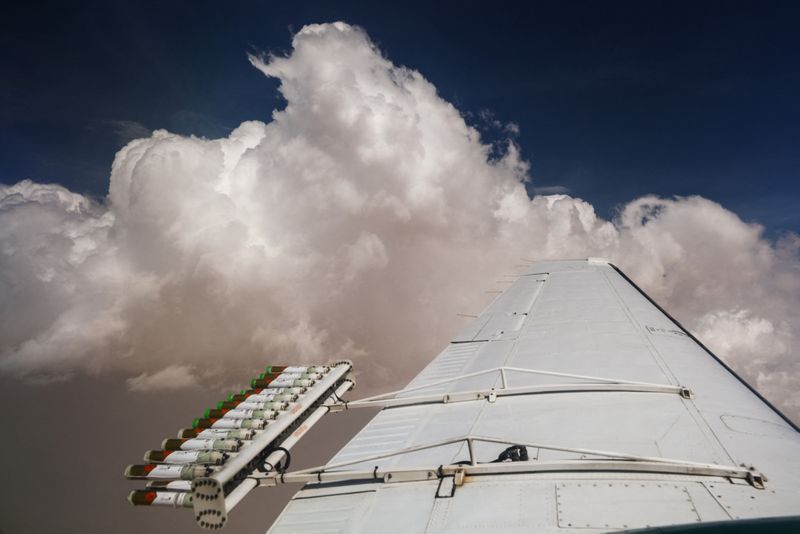Rain enhancement technologies are flourishing in UAE

Image Credit: Ahmed Ramzan/Gulf News
Rain enhancement is critical to boosting water security in dry regions. As both an arid country and an emerging innovation hub, the UAE has proved to be the ideal environment from which to test, pioneer and scale techniques and initiatives in rain enhancement.
In a relatively short time, the country has made a significant contribution to the world’s understanding of rain enhancement and water security.
Deploying cloud seeding for around two decades, the UAE has in that time tested and demonstrated various technologies, including the use of drones for detecting seedable clouds and dispersing seeding materials, the use of artificial intelligence, specifically machine learning, to achieve enhanced precipitation nowcasting using radar, satellite and numerical weather model data to train the artificial intelligence system.

Extent of rainfall formation
That’s not to mention the country’s exploration of cloud electrical properties, warm and cold cloud precipitation processes, artificial cloud creation, land and atmosphere interactions that impact rainfall, and a novel nanotechnology with the potential to increase the rate and extent of rainfall formation.
Aside from further enhancing the country’s extensive meteorology and cloud seeding operations and infrastructure – which include a supercomputer, 100 meteorological stations, a network of radars, specially-designed aircraft and a factory producing high-quality hygroscopic salt flares for seeding – the UAE is supporting the research of scientists locally and around the world to achieve new innovations for rainfall enhancement.
So far, the UAE Research Programme for Rain Enhancement Science has awarded around $18 million in grants to scientists. The impact of all this investment is becoming increasingly apparent.
The country – which records on average 100mm of precipitation annually – has seen the intensity of rainfall increase gradually, with July 2022 breaking a 27-year record for non-stop rainfall.

Image Credit: Gulf News
Increased rainfall
Perhaps more importantly though, understanding of the processes behind this rainfall and the means to stimulate it have increased dramatically. The UAE’s success in rain enhancement is largely due to the enabling ecosystem built to support rain enhancement research and development (R&D).
The country has long been regarded as a regional leader in its drive toward science-based innovation and sustainability. Both priorities are exemplified by the establishment of the Emirates Research Development Council last year and the UAE’s hosting of COP28 this year.
One of the country’s flagship platforms, the UAE Research Program for Rain Enhancement Science (UAEREP), serves as a model for impactful research, development, and innovation that moves research from the laboratory environment to practical value creation. It has also played an important role in shaping the national approach to environmental sustainability.
The programme was designed to cover all key aspects of rainfall advancement, inclusive of modelling, materials, infrastructure and operations, and has been successful in enabling and supporting rapid technology development, particularly numerical weather modelling advances and cloud seeding material, from early-stage research to validation in relevant and operational environments.
Read more
-
Weather alert issued for more rain, temperatures drop by 5 to 7°C in the UAE
-
Rain in Dubai: Global Village will not open today
-
UAE: Rain to continue with lightning and thunder, showers reported in Abu Dhabi, Dubai, Sharjah, Ajman, and Fujairah, minimum temperatures to drop to 3°C
-
Cold weather, heavy rain, thunder, and clouds in Dubai, Ras Al Khaimah, Umm Al Quwain, Fujairah, Ajman and Sharjah till Saturday
Ambitious research projects
A significant part of the programme’s work is facilitating knowledge transfers and enabling the world’s brightest minds to pursue ambitious research projects. It has engaged a wide range of stakeholders, including government agencies, private sector organizations, and international organizations, who are actively encouraged to participate in the programme.
Through its outreach work, the programme now engages a global network of more than 2,400 researchers from over 504 institutions, spread across 70 countries. The programme’s international success demonstrates the value of collaboration and partnership in addressing water security, climate change, and advanced technology development challenges.
An excellent embodiment of the programme’s success in convening stakeholders is the biannual International Rain Enhancement Forum (IREF). IREF serves as an international hub for cloud seeding and weather modification experts.
The forum allows experts from around the world to share their knowledge and expertise, as well as collaborate on the development of new technologies and best practices. These exchanges benefit the broader international community – not just national efforts.
UAEREP’s inclusive approach
IREF’s global outlook reflects UAEREP’s inclusive approach to the challenges that exist in rain enhancement and women empowerment is a key consideration for the programme. UAEREP has actively encouraged the participation and advancement of women in STEM fields, and this is reflected in the high number of women working in the programme, as well as in the leadership positions they hold.
Of the 188 research staff across the 11 awarded projects, almost a quarter are women and we are committed to increasing the percentage. UAEREP’s inclusive approach shows how the programme is aligned with the UAE’s national priorities, such as its focus on gender equality and increasing the participation and representation of women in science and technology.
The programme is also tightly linked to the UAE’s overall strategic approach to environmental sustainability, which includes the Net Zero by 2050 strategic initiative.
Water security is an essential component of this strategy, and the program is critical to ensuring the country has the resources it requires to meet the demands of a growing population and a rapidly developing economy.
Water security in the context of booming populations will be a central theme at COP28 in November. There, the UAE will bring together world leaders to discuss climate action and we can be confident that rain enhancement will be a conversation that crops up consistently throughout the event.
On this global stage, the scientific community and policymakers have an opportunity to drive discussions that could ultimately help to transform water security, not just in the UAE, but around the world.
Dr. Nawal Al Hosany and Dr Steve Griffiths are strategic advisors to UAE Research Program for Rain Enhancement Science (UAEREP)



